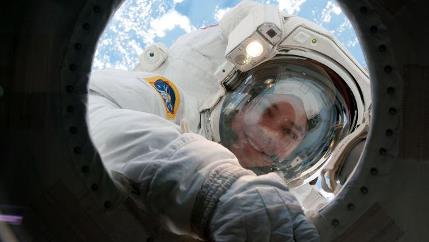When flying to Mars, make sure to monitor and enhance brain function (radiation exposure can hurt performance)
.
Could a trip to Mars fry astronauts’ brains? (The Washington Post):
“Brain damage. Memory deterioration. Intelligence loss. This could be your brain on a trip to Mars…The finding, published in the open-source journal Science Advances this month, could throw a wrench in the many ambitious missions aimed at sending humans to Earth’s nearest neighboring planet…
…a decline in brain function is especially problematic for anyone traveling to Mars, since the 100 million or so miles a message must travel to reach Earth causes a 20-minute delay in communication. Astronauts need to be able to figure things out quickly and on their own…
But aerospace engineer Robert Zubrin, president of the Mars Society and an adviser to Mars One, says that the study’s findings have been blown way out of proportion. Rather than administer small amounts of radiation slowly over the course of many months, the researchers in the mouse study bombarded their subjects with 30 months’ worth of radiation in the course of about 30 seconds.”
Limoli isn’t calling his finding a “show stopper” either, he told Science magazine. It’s just “something NASA needs to consider,” he said.”
Study: What happens to your brain on the way to Mars (Science Advances)
- Abstract: As NASA prepares for the first manned spaceflight to Mars, questions have surfaced concerning the potential for increased risks associated with exposure to the spectrum of highly energetic nuclei that comprise galactic cosmic rays. Animal models have revealed an unexpected sensitivity of mature neurons in the brain to charged particles found in space. Astronaut autonomy during long-term space travel is particularly critical as is the need to properly manage planned and unanticipated events, activities that could be compromised by accumulating particle traversals through the brain. Using mice subjected to space-relevant fluences of charged particles, we show significant cortical- and hippocampal-based performance decrements 6 weeks after acute exposure. Animals manifesting cognitive decrements exhibited marked and persistent radiation-induced reductions in dendritic complexity and spine density along medial prefrontal cortical neurons known to mediate neurotransmission specifically interrogated by our behavioral tasks. Significant increases in postsynaptic density protein 95 (PSD-95) revealed major radiation-induced alterations in synaptic integrity. Impaired behavioral performance of individual animals correlated significantly with reduced spine density and trended with increased synaptic puncta, thereby providing quantitative measures of risk for developing cognitive decrements. Our data indicate an unexpected and unique susceptibility of the central nervous system to space radiation exposure, and argue that the underlying radiation sensitivity of delicate neuronal structure may well predispose astronauts to unintended mission-critical performance decrements and/or longer-term neurocognitive sequelae.
Learn more:



